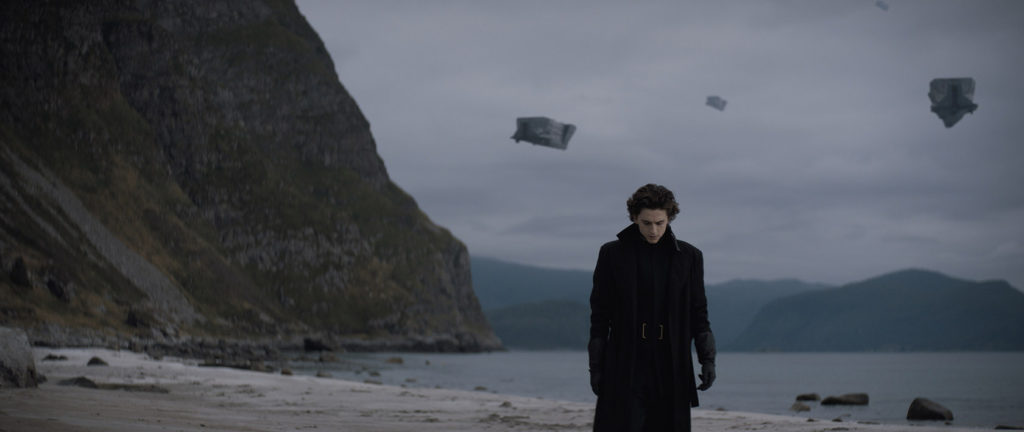by Ieuan Jones
Frank Herbert’s 1965 novel Dune is the biggest-selling science fiction novel of all time. You’d think this will have made his book series, full of gods and monsters, empires and wars, particularly hot property in Hollywood. So it’s perhaps surprising that it’s had a checkered history of adaptations to the big screen. Mexican-Chilean filmmaker and professional nutjob Alejandro Jodorowski was the first to try his hand, back in the seventies. His realisation would have included Mick Jagger, Salvador Dalí and Orson Welles swanning around gigantic space sets designed by H.R. Giger and soundtracked by Pink Floyd. For fourteen hours. Amazingly (or perhaps not), he couldn’t find studio backing for it and so the whole project was mothballed before a single frame was shot.
Next up was David Lynch, who in the early eighties was pretty hot property himself in Tinseltown, following the success of The Elephant Man. Lynch’s version has gone down in Hollywood lore as something of a multi-million dollar fiasco, although that assessment is probably unfair. While his adaptation no doubt has some major flaws (massively incoherent, breathlessly rushed, some seriously shonky effects), it also has an impressively bizarre viewpoint for a major studio picture. This is vividly shown in the characterisation of the Baron (played by the late Kenneth McMillan), floating around menacingly, festering with sores, literally draining his minions dry. (This version also featured Sting in a space-age jockstrap though, so maybe its failure was justified after all.)
And then… nothing, for the longest time, other than the sound of wind whistling on sand (and a TV adaptation in the noughties that no-one watched). Now, however, acclaimed director Denis Villeneuve has stepped up to try and tame this particular sandworm. In many ways, if anyone was born to do it, it’s Villeneuve. He already has impressive pedigree in this arena, having directed two of the grandest and most impressive science fiction films of the past ten years: Arrival and Blade Runner 2049. (Although he now apparently considers these huge extravaganzas to be mere “homework” for this project.)
So, here we are again, ten thousand years in the future, following the story of the young Paul Atreides (Timothée Chalamet). Paul has tagged along with a trade envoy of his father, Duke Leto (Oscar Isaac), to the mysterious desert planet Arrakis, known for possessing huge quantities of a precious mineral, spice. The spice is guarded jealously by nomadic tribes of Fremen, as well as huge subterranean worms that live under the sand, surfacing occasionally to attack those hapless enough to be in their way. It is hoped that Leto can harness the production of spice, because of its properties which aid interdimensional travel (as well as causing the odd mass hallucination). But then, wouldn’t you know, the Atreides are the victim of a treacherous double cross, likely masterminded by the scheming Harkonnens, helmed by the evil Baron (Stellan Skarsgård). Paul and his mother, Lady Jessica (Rebecca Ferguson), a sister from the mystical Bene Gesserit order, are forced to flee and find themselves fighting for survival in the least hospitable place in the galaxy. Yet their arrival on Arrakis also seems to have awakened something in Paul, perhaps to do with some feverish dreams he has been having, featuring him as a prophet and an unknown girl.
I think what makes this version of Dune such a pleasure is that Villeneuve is clearly in love with the material. Among other things, this means he knows to take his time – despite the runtime of two and a half hours, this film covers only the first half or so of the first novel (this is officially subtitled ‘Part One’). The slow unfolding of the story and characters reaches a visceral crescendo with the battle at the Atreides’ temporary base and is expertly done. So it is little wonder this series has already earned the tagline, ‘Star Wars for grownups.’ Yet Villeneuve, typically, finds plenty of space for some startling images among all the scene setting. One particular scene, on the planet Saudukar, is such a rich combination of truly alien sights and sounds it is a dizzying watch. But Villeneuve is not so respectful of the book that he is not above the odd interesting tweak here and there, especially with some of the politics between the generations that feels particularly modern.
So, in short, I am sold already and I cannot wait for the next one (and this from someone who already knows what happens…). While that may be a bit of a wait yet, we should all be grateful that not only Dune, but actual cinema and all that goes with it, has returned at last.
Dune is showing at Plymouth Arts Cinema from Saturday 20 to Thursday 18 November. For tickets and information, visit https://plymouthartscinema.org/whats-on/dune-12a/









Comments
No comment yet.